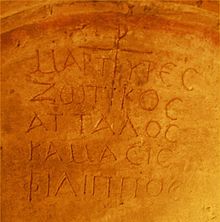
 |
Freethought & Rationalism ArchiveThe archives are read only. |
|
|
#51 | ||||
|
Veteran Member
Join Date: Jan 2008
Location: Latin America
Posts: 4,066
|
Quote:
Quote:
Quote:

|
||||
|
|
|
|
#52 | |
|
Contributor
Join Date: Feb 2006
Location: the fringe of the caribbean
Posts: 18,988
|
I have noticed that many make reference to the Christians implying that there were only Christians who believed in Jesus Christ as found in the NT.
But, being called Christian in antiquity did not mean or always mean a person who believed in Jesus of the NT. There was no such thing as orthodox belief about Jesus Christ and further there was no orthodox doctrine to determine who was a Christian. Anyone could have called themself a Christian. Or inversely anyone could have been called a non-christian by some who claims he was a true Christian. There was no authoritative body that determined who was a Christian. This is the state of affairs of Christians at around the middle of the 2nd century. It was anything goes. This Justin Martyr in "First Apology" 7 Quote:
How can it be determined when people started to call themselves Christians on account of being wise? And it is known that there were Christians in antiquity who did not worship Jesus of the NT at all. |
|
|
|
|
|
#53 | ||
|
Banned
Join Date: Jun 2005
Location: Florida
Posts: 19,796
|
Quote:
Quote:
|
||
|
|
|
|
#54 | ||||
|
Banned
Join Date: Jun 2005
Location: Florida
Posts: 19,796
|
Quote:
Quote:
Quote:
Quote:
Why do you frequently quote a fairy tale without any historical corroboration? Are you an inerrantist? If so, based upon what evidence? If not, why do you frequently quote the Bible? How in the world can you be reasonably certain what Moses, Jesus, and the Pharisees said and did? |
||||
|
|
|
|
#55 | |||
|
Banned
Join Date: Jun 2005
Location: Florida
Posts: 19,796
|
Quote:
Quote:
http://www.catholicity.com/mccloskey...istianity.html The Rise of Christianity by Rodney Stark - published by Princeton University Press, 1996 A Book Review by Father John McCloskey Quote:
What motivated Japanese Kamikaze pilots, and what motivates Muslim terrorists? Obviously, belief in lies or false claims, just like Christian martyrs. |
|||
|
|
|
|
#56 | |||
|
Veteran Member
Join Date: Jan 2008
Location: Latin America
Posts: 4,066
|
Quote:
Quote:
|
|||
|
|
|
|
#57 |
|
Veteran Member
Join Date: Jan 2008
Location: Latin America
Posts: 4,066
|
|
|
|
|
|
#58 | ||
|
Banned
Join Date: Jun 2005
Location: Florida
Posts: 19,796
|
Quote:
Quote:
For many centuries, a large percentage of Christians endorsed slavery, colonization, and the subjugation of women. If you had been born centuries ago, it is reasonably possible if not probable that you would have endorsed those things too, which suggests that secular factors determine what people believe, not a God. You are the one who originally brought up the issue of martyrs by quoting Rodney Stark, <edited> since Stark said, as I showed in my post #55, "First of all, many early Christians probably could not have done so, and some are known to have recanted when the situation arose. Second, persecutions rarely occurred, and only a tiny number of Christians ever were martyred.......There was surprisingly little effort to persecute Christians, and when a wave of persecutions occurred, usually only bishops and other prominent figures were singled out." It is quite interesting that you brought up the issue of martyrs even though your own source says that Christians were rarely persecuted, and that only a tiny number were martyred. |
||
|
|
|
|
#59 | |
|
Banned
Join Date: Jun 2005
Location: Florida
Posts: 19,796
|
Quote:
|
|
|
|
|
|
#60 | |||||||
|
Veteran Member
Join Date: Jan 2008
Location: Latin America
Posts: 4,066
|
Quote:
Quote:
 Quote:
Quote:
|
|||||||
|
|
| Thread Tools | Search this Thread |
|